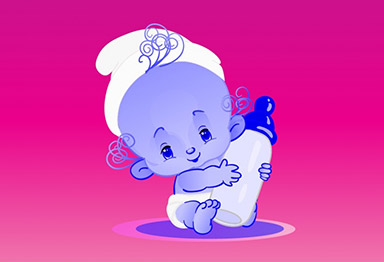How is Cow’s milk different form breast milk?
Studies show that, Cow’s milk and human milk contain a similar percentage of water, but the relative amounts of fat, carbohydrate, protein, vitamins and minerals vary widely.
1. Fats : In humans, babies brain develops rapidly during the first year, faster than the body and tripling in size with in the first year and brains are largely composed of fat and early brain development requires sufficient amount of fats. While breast milk contains sufficient amount of polyunsaturated fats called omega 3 and omega 6 fatty acids, Cow’s milk is higher in saturated fats which helps in the growth of body size of the cow to 200 to 300 kgs in one year. So cow’s milk helps in body building of the calf while breast milk helps in brain development of the human baby.
2. Calcium: We have grown up seeing advertisements of calcium and milk. The calcium content in cow’s milk is no doubt very high, as much as 120mg per 100ml. This is nearly four times greater than that of human milk (34mg per 100ml). One of the reasons the calcium content is so high in cow’s milk is again because the calves grow faster and have a larger skeleton and larger bones than humans. Although human milk contains less calcium, it is more easily absorbed than that found in cows’ milk and is adequate for the baby. High amount of calcium in Cow’s milk also reduces the iron absorption, thus babies fed cow’s milk become iron deficient.
3. Protein: Protein is linked to growth. Calves need more protein for their fast growth rate than human babies! That’s why cows’ milk has twice as much protein as human breast milk. The weight gain of calves during their first year is nearly 40 times greater than that of breastfed human infants!
4. Iron: Iron levels in cow milk differ from human milk and its iron content. Cows’ milk contains very little iron, which is another reason why it is deemed to be unsuitable for infants under the age of one year. So babies fed cow’s milk may risk being anemic because of iron deficiency.
So what happens to babies below age one, who are fed Cow’s milk?
- Cow’s milk to babies below the age of one year is a growing factor behind allergic diseases, including respiratory and digestive system, as they cannot tolerate protein in the milk. Allergy is a result of one or more cow’s milk proteins triggering an adverse reaction by our body’s immune system. The symptoms of milk allergy in children may vary on the severity, further affecting several organ systems such as skin, digestive or the respiratory tract, possibly resulting in skin rash, eczema, vomiting, diarrhea, colic, wheezing or excessive crying.
- Cow’s milk contains high concentrations of protein and minerals, which can stress a newborn's immature kidneys and cause severe illness at times of heat stress, fever, or diarrhea.
- Cow's milk lacks the proper amounts of iron, vitamin C, and other nutrients that infants need. It may even cause iron-deficiency anemia in some babies, since cow's milk protein can irritate the lining of the stomach and intestine, leading to loss of blood into the stools.
- Iron deficiency anemia is one of the most common and severe problems associated with cow milk consumption in newborns. Left untreated, this deficiency can lead to lifelong learning disabilities and delayed motor development.
What is an alternative?
Breastfeeding the baby until one year is the best. But not all mothers are physically able to breastfeed or may not be able to breastfeed for various reasons. In such cases infant formula is the best option.
- Infant formula milk contains more iron and vitamins than cow's milk. Infant formulas are designed to mimic breast milk's nutrition as closely as possible.
- Formulas provide the majority of the same nutrients in the same amounts compared to breast milk. Of course the main difference between infant formula and human breast milk is the lack of live antibodies in infant formula. The formula development process assures not only vitamin and minerals levels are appropriate to the babies but also the amount and type of fats,protein and sugars, for example - Per 100 grams, breast milk contains 1 gram, infant formula contains 2 grams, and whole milk contains 3.3 grams of protein. The large amount of protein found in whole milk can damage the infant's developing kidneys. By enhancing digestibility and reducing the protein amount, infant formula protein is similar to breast milk protein.
- Infants need linoleic acid and other essential fatty acids for healthy brain development. Linoleic acid is nonexistent in whole milk. In order to provide optimal levels of essential fatty acids and improved digestibility, infant formula contains vegetable oil.
In conclusion, Infants who do not get breast milk need an alternative form of nutrition to maintain their health. Infant formula is a better alternative than cow’s milk for all the reasons explained above.

